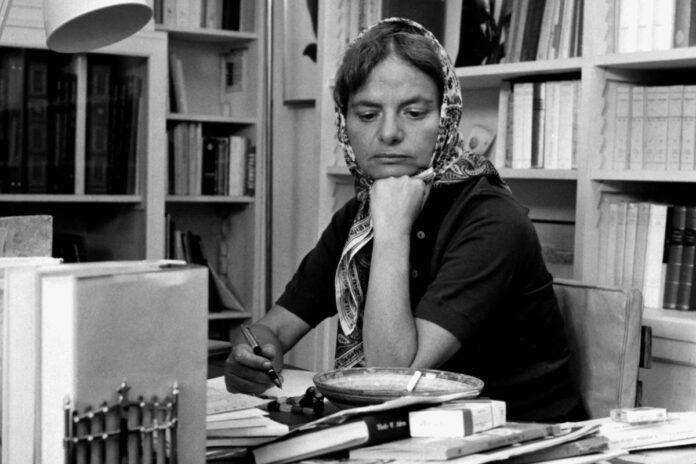Elsa Morante stands as one of the most significant Italian novelists of the 20th century. Renowned for her deeply emotional and intricately crafted narratives, Morante’s work delves into themes of love, identity, and the human condition. This article explores Morante’s life, her major works, and her enduring impact on literature.
Early Life and Background
Birth and Family
Elsa Morante was born on August 18, 1912, in Rome, Italy. She was the daughter of Irma Poggibonsi, a Jewish schoolteacher, and Francesco Lo Monaco, a Sicilian elementary school principal. Her upbringing in a culturally rich and intellectually stimulating environment greatly influenced her literary pursuits.
Education and Early Influences
Morante showed an early aptitude for writing, penning stories and poems during her childhood. Her formal education was irregular, but she was a voracious reader, immersing herself in the works of classical and contemporary writers. Influences such as James Joyce, Marcel Proust, and Virginia Woolf played a significant role in shaping her narrative style and thematic concerns.
Literary Career and Major Works
Early Writing and Short Stories
Morante began her literary career writing short stories, many of which were published in various magazines. Her early work showcased her talent for capturing the intricacies of human emotions and relationships. These stories laid the groundwork for her later novels, which would explore similar themes with greater depth and complexity.
“Menzogna e Sortilegio” (“House of Liars”)
Morante’s first novel, “Menzogna e Sortilegio” (“House of Liars”), published in 1948, is a sprawling, multi-generational saga that explores themes of love, betrayal, and the passage of time. The novel is narrated by Elisa, who recounts the turbulent history of her family, weaving together personal and historical events. “House of Liars” received critical acclaim and established Morante as a significant voice in Italian literature.
“L’isola di Arturo” (“Arturo’s Island”)
“L’isola di Arturo” (“Arturo’s Island”), published in 1957, is one of Morante’s most celebrated works. The novel tells the story of Arturo Gerace, a young boy growing up on the isolated island of Procida. Through Arturo’s eyes, the reader experiences his coming-of-age journey, marked by his longing for his absent mother and his complex relationship with his father. The novel’s exploration of themes such as isolation, identity, and the loss of innocence earned Morante the prestigious Strega Prize.
“La Storia” (“History: A Novel”)
In 1974, Morante published “La Storia” (“History: A Novel”), which is widely considered her masterpiece. Set against the backdrop of World War II and its aftermath, the novel follows the life of Ida Ramundo, a half-Jewish schoolteacher, and her son, Useppe. “History: A Novel” paints a vivid and harrowing picture of the impact of war on ordinary people, exploring themes of survival, resilience, and the human capacity for both cruelty and compassion. The novel’s epic scope and emotional depth solidified Morante’s status as one of the greatest novelists of her time.
“Aracoeli”
Morante’s final novel, “Aracoeli,” published in 1982, tells the story of Manuel, a middle-aged man who embarks on a journey to his mother’s native Spain in search of his lost childhood. The novel delves into themes of memory, loss, and the search for identity. While not as widely acclaimed as her earlier works, “Aracoeli” is a poignant and introspective exploration of the complexities of familial relationships and personal history.
Themes and Style
Exploration of Human Emotions
A hallmark of Morante’s writing is her deep and nuanced exploration of human emotions. Her characters are often driven by intense passions and inner conflicts, which Morante portrays with great psychological insight and empathy. This emotional depth lends her narratives a timeless and universal quality, allowing readers to connect with her characters on a profound level.
Use of Realism and Fantasy
Morante’s work is characterized by a blend of realism and fantasy. While her novels often depict the harsh realities of life, they are also imbued with a sense of magic and wonder. This interplay between the real and the imagined allows Morante to explore complex themes and ideas in a rich and evocative manner.
Historical and Social Contexts
Morante’s novels are deeply rooted in their historical and social contexts. She often uses historical events as a backdrop for her stories, exploring how these events shape the lives of her characters. This historical grounding adds a layer of depth and significance to her narratives, highlighting the interconnectedness of personal and collective histories.
Later Life and Legacy
Personal Struggles and Relationships
Morante’s personal life was marked by emotional and psychological struggles. She was married to the writer Alberto Moravia, but their relationship was tumultuous and ultimately ended in separation. Despite her personal difficulties, Morante remained dedicated to her writing, which she viewed as a means of understanding and coping with the complexities of life.
Death and Posthumous Recognition
Elsa Morante passed away on November 25, 1985, in Rome. Her death marked the end of a prolific and influential literary career, but her legacy continues to be celebrated. Posthumously, Morante has been recognized as one of the most important Italian writers of the 20th century. Her works are studied in literature courses around the world, and her influence can be seen in the writings of contemporary authors.
Major Works and Their Significance
“Menzogna e Sortilegio” (“House of Liars”)
“House of Liars” is significant for its intricate narrative structure and its exploration of themes such as love, betrayal, and the passage of time. The novel’s multi-generational saga and its rich character development showcase Morante’s storytelling prowess and her ability to capture the complexities of human relationships.
“L’isola di Arturo” (“Arturo’s Island”)
“Arturo’s Island” is celebrated for its lyrical prose and its poignant portrayal of a young boy’s coming-of-age journey. The novel’s exploration of themes such as isolation, identity, and the loss of innocence resonates with readers of all ages, making it a timeless classic.
“La Storia” (“History: A Novel”)
“History: A Novel” is widely regarded as Morante’s masterpiece. The novel’s epic scope, emotional depth, and vivid portrayal of the impact of war on ordinary people have earned it a place among the greatest works of Italian literature. Its exploration of themes such as survival, resilience, and the human capacity for both cruelty and compassion make it a powerful and enduring work.
“Aracoeli”
While “Aracoeli” is not as widely acclaimed as Morante’s earlier works, it is a poignant and introspective exploration of themes such as memory, loss, and the search for identity. The novel’s introspective nature and its exploration of familial relationships offer readers a deeply personal and emotional reading experience.
Influence on Literature and Culture
Literary Influence
Elsa Morante’s influence on literature is vast and far-reaching. Her innovative narrative techniques, emotional depth, and exploration of complex themes have inspired countless writers. Her works are studied and admired for their literary excellence and their ability to capture the intricacies of the human condition.
Cultural Impact
Morante’s impact on Italian culture is profound. Her novels provide a vivid and insightful portrayal of Italian society and history, offering readers a window into the cultural and social contexts of her time. Her exploration of themes such as love, identity, and the human condition resonates with readers across cultures and generations.
Contributions to Italian Literature
Morante’s contributions to Italian literature are unparalleled. Her innovative use of language, her exploration of complex themes, and her ability to capture the emotional depth of her characters have set a high standard for literary excellence. Her works have played a significant role in shaping the landscape of modern Italian literature.
Personal Reflections and Character
Moral and Ethical Concerns
Morante’s works are imbued with a strong sense of moral and ethical concern. Her characters often grapple with issues of justice, identity, and the human condition, reflecting Morante’s own deeply held beliefs. Her commitment to exploring the complexities of human emotions and relationships has made her works enduringly relevant and resonant.
Intellectual Curiosity and Engagement
Morante was known for her intellectual curiosity and her engagement with the cultural and social issues of her time. Her writings reflect a deep understanding of literature, philosophy, and history, and her willingness to engage with complex ideas and themes. Morante’s intellectual rigor and her commitment to exploring the human condition have made her a model for writers and thinkers.
FAQs
1. What are some of Elsa Morante’s most famous works?
Some of Elsa Morante’s most famous works include “Menzogna e Sortilegio” (“House of Liars”), “L’isola di Arturo” (“Arturo’s Island”), “La Storia” (“History: A Novel”), and “Aracoeli.”
2. How did Elsa Morante influence the development of Italian literature?
Elsa Morante influenced the development of Italian literature through her innovative narrative techniques, emotional depth, and exploration of complex themes. Her works have set a high standard for literary excellence and have inspired countless writers.
3. What themes are commonly explored in Morante’s work?
Common themes in Morante’s work include love, identity, isolation, the human condition, and the impact of historical events on individual lives. Her works often reflect her deep understanding of human emotions and relationships.
4. Where can I learn more about Elsa Morante’s literary contributions?
You can learn more about Elsa Morante’s literary contributions through biographies, literary analyses, and collections of her works. Recommended books include “Elsa Morante: The Politics of Writing” by Reneé M. LaRue and “The Novels of Elsa Morante: A Critical Study” by Angela M. Jeannet.
5. What is the significance of “History: A Novel” in Morante’s oeuvre?
“History: A Novel” is significant in Morante’s oeuvre for its epic scope, emotional depth, and vivid portrayal of the impact of war on ordinary people. The novel’s exploration of themes such as survival, resilience, and the human capacity for both cruelty and compassion make it a powerful and enduring work.
Conclusion
Elsa Morante’s contributions to literature and culture are unparalleled. Her innovative narrative techniques, emotional depth, and exploration of complex themes have left an indelible mark on the literary world. From her early short stories to her masterpieces such as “Arturo’s Island” and “History: A Novel,” Morante’s works continue to inspire and challenge readers around the world. As one of Italy’s greatest literary legends, Elsa Morante’s legacy will endure for generations to come, ensuring that her name remains synonymous with literary excellence and cultural significance.

